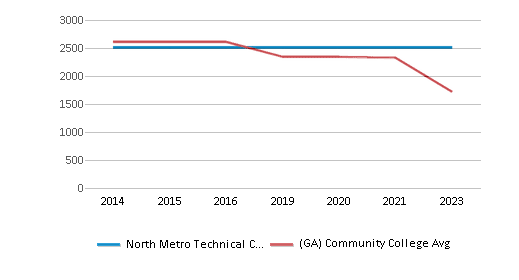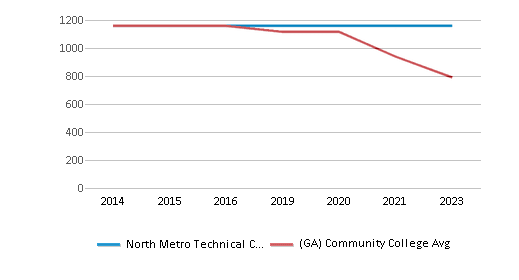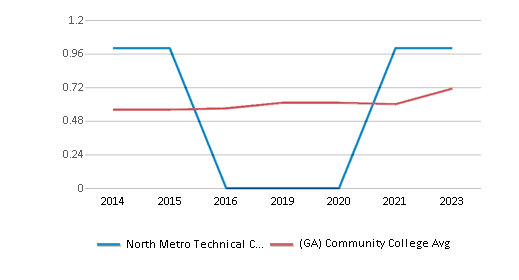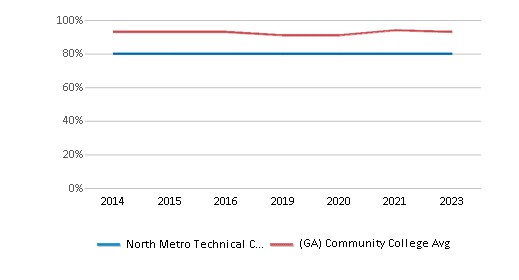- North Metro Technical College in Acworth is now part of the newly formed Chattahoochee Technical College. Beginning on July 1, 2009, The Appalachian, Chattahoochee, and North Metro Technical Colleges merged to form one institution and became the leading post secondary technical college in Georgia. NMTC is known as the North Metro campus of Chattahoochee Technical College. The new Chattahoochee Tech serves over 10,000 students from eight campuses spread over six North Georgia counties. The other campus names are: Appalachian Campus, Canton Campus, Marietta Campus, Mountain View Campus, Paulding Campus, South Cobb Campus, and Woodstock Campus.
School Highlights
North Metro Technical College serves 2,512 students
Minority enrollment is 100% of the student body (majority Black and Hispanic), which is less than the state average of 61%.
Quick Stats (2025)
- Enrollment: 2,512 students
- Source: Integrated Postsecondary Education Data System (IPEDS)
Top Rankings
North Metro Technical College ranks among the top 20% of public schools in Georgia for:
Category
Attribute
School Overview
North Metro Technical College
(GA) Community College Avg.
Carnegie Classification
Associates--Public Suburban-serving Sing
Associates--Public Rural-serving Medium
Institution Level
At least 2 years but < 4 years
At least 2 but less than 4 years
Institution Control
Public
Public
Total Faculty
n/a
209 staff
School Calendar
Student Body
The student population of North Metro Technical College has stayed relatively flat over five years.
The North Metro Technical College diversity score of 1.00 is more than the state average of 0.71. The school's diversity has stayed relatively flat over five years.
Total Enrollment
2,512 students
2,242 students

Student : Teacher Ratio
n/a
18:1
# Full-Time Students
n/a
882 students
# Part-Time Students
n/a
1,722 students
# Enrollment Undergraduate
n/a
299 students
# Full-Time Undergraduate Students
1,159 students
929 students

# Full-Time Graduate Students
n/a
87 students
# Part-Time Undergraduate Students
1,353 students
1,891 students
# Part-Time Graduate Students
n/a
53 students
Total Dormitory Capacity
n/a
654 students
% Asian
n/a
4%
% Hispanic
n/a
10%
% Black
n/a
35%
% White
n/a
39%
% Hawaiian
n/a
1%
% Two or more races
n/a
3%
% Non Resident races
n/a
1%
% Unknown races
100%
7%
Diversity Score
n/a
0.71

College Completion Rate (Students who graduate in less than 4 years)
n/a
0.4279%
College Completion Rate (Students who graduate in 4 years or more than 4 years)
n/a
0.2368%
Tuition and Acceptance Rate
% Students Receiving Some Financial Aid
80%
93%

Median Debt for Graduates
n/a
$12,139
Median Debt for Dropouts
n/a
$5,500
Acceptance Rate
n/a
75%
SAT Reading
n/a
465
SAT Math
n/a
450
SAT Writing
n/a
465
ACT Composite
n/a
18
ACT English
n/a
18
ACT Math
n/a
18
ACT Writing
n/a
7
Source: 2023 (or latest year available) Integrated Postsecondary Education Data System (IPEDS)
Frequently Asked Questions
What schools are North Metro Technical College often compared to?
North Metro Technical Collegeis often viewed alongside schools like Chattahoochee Technical College by visitors of our site.
What is North Metro Technical College's ranking?
North Metro Technical College ranks among the top 20% of community college in Georgia for: Average community college minority breakdown.
Recent Articles

Obtaining Your Bachelor's Degree at a Community College
Explore the evolving landscape of community colleges offering bachelor's degrees, addressing affordability, accessibility, and workforce needs.

A to Z of Community College Certificates and Courses
From business and healthcare to technology and skilled trades, the article showcases the breadth of options available to students seeking to enhance their knowledge, develop new skills, or pursue career advancement.

What is a Community College?
This comprehensive guide explains what a community college is, its history, and its role in higher education. It covers the types of programs offered, differences from four-year colleges, benefits of attending, and important considerations for prospective students, providing valuable insights for those exploring educational options.






